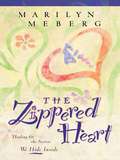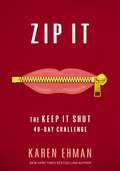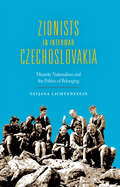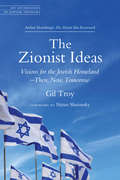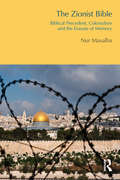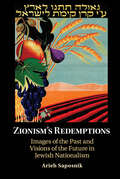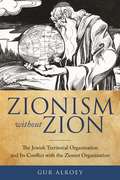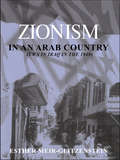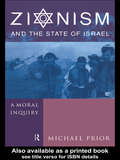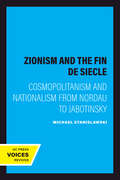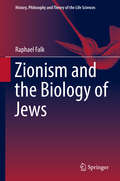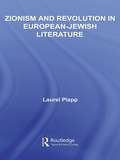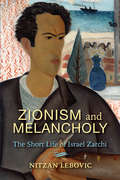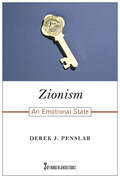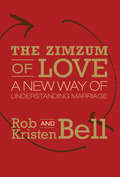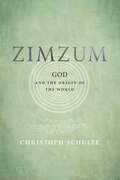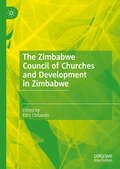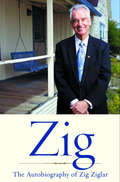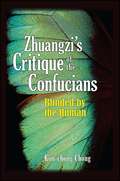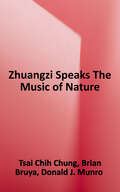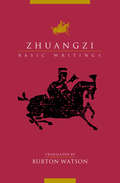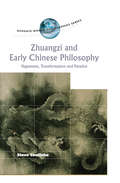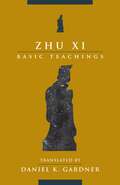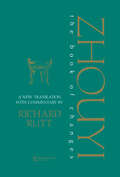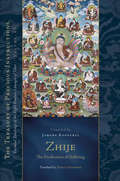- Table View
- List View
The Zippered Heart
by Marilyn Meberg"Why did I say that? Why did I do that? Where on earth did those mean thoughts and motivations come from? I'm so glad no one can read my mind." We all get whiplashed and sometimes broadsided by the "dark" side of our nature, which produces thoughts and behaviors that cause us to feel ashamed. many of us deny that part of ourselves, and kick it off somewhere in the shadowy recesses of the heart, where we hope it will stay put, not cause us any more trouble, and hopefully not be noticed.In The Zippered Heart, Marilyn does a gentle exploration of those secrets and issues which, if denied, can rob us of the abundant life we are promised in Christ. God means for us to be whole. This book is an encouragement in that process."This book will change lives, because it requires that we look precisely at both the dark and the light sides of ourselves. Then it brings an overflowing grace and forgiveness. As a psychologist with thirty-five years of clinical experience, I can say that this is one of the best books I have read." -Neil Clark Warren, author of Finding the Love of Your Life"Step into liberty through the rapscallion brilliance of Marilyn Meberg." -Patsy Clairmont, author of Mending Your Heart in a Broken World"For thirty years Marilyn's compassionate exploration of the human heart has amazed me. Now, with skill and tenderness she opens that heart for all of us to see how fearfully and wonderfully we are made." -Luci Swindoll, author, speaker, Women of Faith"The Zippered Heart is a perceptive and sensitive examination of the 'war within' between our two natures." -Archibald D. Hart, Ph.D., Professor of Psychology, Graduate School of Psychology, Fuller Theological Seminary
Zip It: The Keep It Shut 40-Day Challenge
by Karen EhmanZip It empowers readers to put into action the advice and commands of Scripture concerning the tongue. The New York Times bestselling book Keep It Shut covered many topics, including anger, truth-telling, people-pleasing, our digital tongues online, and gossip. Because there are more than 3,500 verses in the Bible that relate to our words and our silence, Keep It Shut only scratched the surface of these issues. Karen Ehman now takes a deeper look and offers practical how-to’s that will inspire you use your words to build, to bless, to encourage, and to praise.Each of the forty interactive entries includes a Scripture verse focus for the day, a story or teaching point, and reflection questions with space for readers to write their answers and thoughts. Each entry ends with both a challenge that will help you carry out the directive in the verse and a prayer prompt. Rather than a traditional devotional,the entries in Zip It build upon each other, equipping you with new habits in how to, or not to, use words.
Zionists in Interwar Czechoslovakia: Minority Nationalism And The Politics Of Belonging (The\modern Jewish Experience Ser.)
by Tatjana LichtensteinThis book presents an unconventional history of minority nationalism in interwar Eastern Europe. Focusing on an influential group of grassroots activists, Tatjana Lichtenstein uncovers Zionist projects intended to sustain the flourishing Jewish national life in Czechoslovakia.The book shows that Zionism was not an exit strategy for Jews, but as a ticket of admission to the societies they already called home.It explores how and why Zionists envisioned minority nationalism as a way to construct Jews' belonging and civic equality in Czechoslovakia.By giving voice to the diversity of aspirations within interwar Zionism, the book offers a fresh view of minority nationalism and state building in Eastern Europe.
The Zionist Ideas: Visions for the Jewish Homeland—Then, Now, Tomorrow (JPS Anthologies of Jewish Thought)
by Gil Troy Natan SharanskyThe most comprehensive Zionist collection ever published, The Zionist Ideas: Visions for the Jewish Homeland—Then, Now, Tomorrow sheds light on the surprisingly diverse and shared visions for realizing Israel as a democratic Jewish state. Building on Arthur Hertzberg’s classic, The Zionist Idea, Gil Troy explores the backstories, dreams, and legacies of more than 170 passionate Jewish visionaries—quadruple Hertzberg’s original number and now including women, mizrachim, and others—from the 1800s to today. Troy divides the thinkers into six Zionist schools of thought—Political, Revisionist, Labor, Religious, Cultural, and Diaspora Zionism—and reveals the breadth of the debate and surprising syntheses. He also presents the visionaries within three major stages of Zionist development, demonstrating the length and evolution of the conversation. Part 1 (pre-1948) introduces the pioneers who founded the Jewish state, such as Herzl, Gordon, Jabotinsky, Kook, Ha’am, and Szold. Part 2 (1948 to 2000) features builders who actualized and modernized the Zionist blueprints, such as Ben-Gurion, Berlin, Meir, Begin, Soloveitchik, Uris, and Kaplan. Part 3 showcases today’s torchbearers, including Barak, Grossman, Shaked, Lau, Yehoshua, and Sacks. This mosaic of voices will engage equally diverse readers in reinvigorating the Zionist conversation—weighing and developing the moral, social, and political character of the Jewish state of today and tomorrow.
The Zionist Bible: Biblical Precedent, Colonialism and the Erasure of Memory (BibleWorld)
by Nur MasalhaThroughout the history of European imperialism the grand narratives of the Bible have been used to justify settler-colonialism. "The Zionist Bible" explores the ways in which modern political Zionism and Israeli militarism have used the Bible - notably the Book of Joshua and its description of the entry of the Israelites into the Promised Land - as an agent of oppression and to support settler-colonialism in Palestine. The rise of messianic Zionism in the late 1960s saw the beginnings of a Jewish theology of zealotocracy, based on the militant land traditions of the Bible and justifying the destruction of the previous inhabitants. "The Zionist Bible" examines how the birth and growth of the State of Israel has been shaped by this Zionist reading of the Bible, how it has refashioned Israeli-Jewish collective memory, erased and renamed Palestinian topography, and how critical responses to this reading have challenged both Jewish and Palestinian nationalism.
Zionism’s Redemptions: Images of the Past and Visions of the Future in Jewish Nationalism
by Arieh SaposnikIn this volume, Arieh Saposnik examines the complicated relations between nationalism and religious (and non-religious) redemptive traditions through the case study of Zionism. He provides a new framework for understanding the central ideas of this movement and its relationship to traditional Jewish ideas, Christian thought, and modern secular messianisms. Providing a longue-durée and broad view of the central themes and motivations in the making of Zionism, Saposnik connects its intellectual history with the concrete development of the Zionist project in Israel in its cultural, social, and political history. Saposnik demonstrates how Zionism offers lessons for a politics in which human perfectibility continues to serve as a guiding light and as a counter-narrative to the contemporary politics of self-interest, self-promotion and 'post-truth.' This is a study that bears implications for our understanding of modernity, of space and place, history and historical trajectories, and the place of Jews and Judaism in the modern world.
Zionism without Zion: The Jewish Territorial Organization and Its Conflict with the Zionist Organization
by Gur AlroeyWhile the ideologies of Territorialism and Zionism originated at the same time, the Territorialists foresaw a dire fate for Eastern European Jews, arguing that they could not wait for the Zionist Organization to establish a Jewish state in Palestine. This pessimistic worldview led Territorialists to favor a solution for the Jewish state "here and now"--and not only in the Land of Israel. In Zionism without Zion: The Jewish Territorial Organization and Its Conflict with the Zionist Organization, author Gur Alroey examines this group's unique perspective, its struggle with the Zionist movement, its Zionist rivals' response, and its diplomatic efforts to obtain a territory for the Jewish people in the first decades of the twentieth century. Alroey begins by examining the British government's Uganda Plan and the ensuing crisis it caused in the Zionist movement and Jewish society. He details the founding of the Jewish Territorial Organization (ITO) in 1903 and explains the varied reactions that the Territorialist ideology received from Zionists and settlers in Palestine. Alroey also details the diplomatic efforts of Territorialists during their desperate search for a suitable territory, which ultimately never bore fruit. Finally, he attempts to understand the reasons for the ITO's dissolution after the Balfour Declaration, explores the revival of Territorialism with the New Territorialists in the 1930s and 1940s, and describes the similarities and differences between the movement then and its earlier version. Zionism without Zion sheds new light on the solutions Territorialism proposed to alleviate the hardship of Eastern European Jews at the start of the twentieth century and offers fresh insights into the challenges faced by Zionism in the same era. The thorough discussion of this under-studied ideology will be of considerable interested to scholars of Eastern European history, Jewish history, and Israel studies.
Zionism in an Arab Country: Jews in Iraq in the 1940s
by Esther Meir-GlitzensteinZionism in an Arab Country explores the relations between the Zionist establishment in Israel, and the Jewish community in Iraq. This relationship is centred on two organizations: a Zionist movement and a defense organization. By reviewing the activity of these organizations, Esther Meir-Glitzstein examines the decade preceding mass immigration, and reveals the political, societal, economic and cultural developments that shaped the history of Iraqi Jewry in this crucial period.Beyond the main focus on the sphere of Zionist activity, Meir-Glitzstein also uncovers the basic problems that shaped both the development of Iraqi Jewry in the 1940s and the policy of the Zionist establishment - trapped between Arab nationalism and Jewish nationalism. Finally, she elucidates the reasons and circumstances that led to the mass immigration of Jews from Iraq to the state of Israel.
Zionism and the State of Israel: A Moral Inquiry
by The Rev Cm Michael PriorZionism and the State of Israel provides a topical and controversial analysis of the development of Zionism and the recent history and politics of Israel.This thought-provoking study examines the ways in which the Bible has been used to legitimize the implementation of the ideological and political programme of Zionism, and the consequences this has had.
Zionism and the Fin de Siecle: Cosmopolitanism and Nationalism from Nordau to Jabotinsky
by Michael StanislawskiMichael Stanislawski's provocative study of Max Nordau, Ephraim Moses Lilien, and Vladimir Jabotinsky reconceives the intersection of the European fin de siècle and early Zionism. Stanislawski takes up the tantalizing question of why Zionism, at a particular stage in its development, became so attractive to certain cosmopolitan intellectuals and artists. With the help of hundreds of previously unavailable documents, published and unpublished, he reconstructs the ideological journeys of writer and critic Nordau, artist Lilien, and political icon Jabotinsky. He argues against the common conception of Nordau and Jabotinsky as nineteenth-century liberals, insisting that they must be understood against the backdrop of Social Darwinism in the West and the Positivism of Russian radicalism in the fin de siècle, as well as Symbolism, Decadence, and Art Nouveau. When these men turned to Zionism, Stanislawski says, far from abandoning their aesthetic and intellectual preconceptions, they molded Zionism according to their fin de siècle cosmopolitanism. Showing how cosmopolitanism turned to nationalism in the lives and work of these crucial early Zionists, this story is a fascinating chapter in European and Russian, as well as Jewish, cultural and political history.
Zionism and the Biology of Jews
by Raphael FalkThis book offers a unique perspective on Zionism. The author, a geneticist by training, focuses on science, rather than history. He looks at the claims that Jews constitute a people with common biological roots. An argument that helps provide justification for the aspirations of this political movement dedicated to the return of the Jewish people to their homeland. His study explores two issues. The first considers the assertion that there is a biology of the Jews. The second deals with attempts to integrate this idea into a consistent history. Both issues unfolded against the background of a romantic national culture of Western Europe in the 19th century: Jews, primarily from Eastern Europe, began to believe these notions and soon they took the lead in the re-formulation of Jewish and Zionist existence. The author does not intend to present a comprehensive picture of the biological literature of the origins of a people and the blood relations between them. He also recognizes that the subject is emotionally-loaded. The book does, however, present a profound mediation on three overlapping questions: What is special or unique to the Jews? Who were the genuine Jews? And how can one identify Jews? This volume is a revised and edited English version of Tzionut Vehabiologia shel Hayehudim, published in 2006.
Zionism and Revolution in European-Jewish Literature (Literary Criticism and Cultural Theory)
by Laurel PlappZionism and Revolution in European-Jewish Literature examines twentieth-century Jewish writing that challenges imperialist ventures and calls for solidarity with the colonized, most notably the Arabs of Palestine and Africans in the Americas. Since Edward Said defined orientalism in 1978 as a Western image of the Islamic world that has justified domination, critics have considered the Jewish people to be complicit with orientalism because of the Zionist movement. However, the Jews of Europe have themselves been caught between East and West —both marginalized as the "Orientals" of Europe and connected to the Middle East through their own political and cultural ties. As a result, European-Jewish writers have had to negotiate the problematic confluence of antisemitic and orientalist discourse. Laurel Plapp traces this trend in utopic visions of Jewish-Muslim relations that criticized the early Zionist movement; in post-Holocaust depictions of coalition between Jews and African slaves in the Caribbean revolutions; and finally, in explorations of diasporic, transnational Jewish identity after the founding of Israel. Above all, Plapp proposes that Jewish studies and postcolonial studies have much in common by identifying ways in which Jewish writers have allied themselves with colonized and exilic peoples throughout the world.
Zionism and Melancholy: The Short Life of Israel Zarchi (New Jewish Philosophy and Thought)
by Nitzan LebovicNitzan Lebovic claims that political melancholy is the defining trait of a generation of Israelis born between the 1960s and 1990s. This cohort came of age during wars, occupation and intifada, cultural conflict, and the failure of the Oslo Accords. The atmosphere of militarism and conservative state politics left little room for democratic opposition or dissent. Lebovic and others depict the failure to respond not only as a result of institutional pressure but as the effect of a long-lasting "left-wing melancholy." In order to understand its grip on Israeli society, Lebovic turns to the novels and short stories of Israel Zarchi. For him, Zarchi aptly describes the gap between the utopian hope present in Zionism since its early days and the melancholic reality of the present. Through personal engagement with Zarchi, Lebovic develops a philosophy of melancholy and shows how it pervades Israeli society.
Zionism: An Emotional State (Key Words in Jewish Studies)
by Derek J. PenslarEmotion lies at the heart of all national movements, and Zionism is no exception. For those who identify as Zionist, the word connotes liberation and redemption, uniqueness and vulnerability. Yet for many, Zionism is a source of distaste if not disgust, and those who reject it are no less passionate than those who embrace it. The power of such emotions helps explain why a word originally associated with territorial aspiration has survived so many years after the establishment of the Israeli state. Zionism: An Emotional State expertly demonstrates how the energy propelling the Zionist project originates from bundles of feeling whose elements have varied in volume, intensity, and durability across space and time. Beginning with an original typology of Zionism and a new take on its relationship to colonialism, Penslar then examines the emotions that have shaped Zionist sensibilities and practices over the course of the movement’s history. The resulting portrait of Zionism reconfigures how we understand Jewish identity amidst continuing debates on the role of nationalism in the modern world.
The Zimzum of Love: A New Way of Understanding Marriage
by Rob Bell Kristen BellThere is a mysterious, indescribable, complex exchange that can happen in the space between you and your partner. You find each other. Your centers of gravity expand as your lives become more and more entwined. You create space for this other person to thrive while they're doing the same for you. This creates a flow of energy in the space between you. This energy field is at the heart of marriage. It flows in the space between you, space that exists nowhere else in the universe. You can become more familiar with how this energy field works. You can develop language between you to identify what's happening in the space between you. You can sharpen your abilities to assess it. You can act in certain ways to increase the flow. You can identify what's blocking the flow, and then you can overcome those barriers. Years into your marriage, you can continue to intensify this energetic flow between you.It is risky to give yourself to another. There are no guarantees, and there are lots of ways for it to fall apart and break your heart. But the upside is infinite.--from The Zimzum of LoveNew York Times bestselling author Rob Bell and his wife, Kristen Bell, explore a whole new way of understanding our most intimate and powerful relationship: marriage. The concepts behind The Zimzum of Love open ways for us to transform and deepen how we love.
Zimzum: God and the Origin of the World (Jewish Culture and Contexts)
by Christoph SchulteThe Hebrew word zimzum originally means “contraction,” “withdrawal,” “retreat,” “limitation,” and “concentration.” In Kabbalah, zimzum is a term for God’s self-limitation, done before creating the world to create the world. Jewish mystic Isaac Luria coined this term in Galilee in the sixteenth century, positing that the God who was “Ein-Sof,” unlimited and omnipresent before creation, must concentrate himself in the zimzum and withdraw in order to make room for the creation of the world in God’s own center. At the same time, God also limits his infinite omnipotence to allow the finite world to arise. Without the zimzum there is no creation, making zimzum one of the basic concepts of Judaism.The Lurianic doctrine of the zimzum has been considered an intellectual showpiece of the Kabbalah and of Jewish philosophy. The teaching of the zimzum has appeared in the Kabbalistic literature across Central and Eastern Europe, perhaps most famously in Hasidic literature up to the present day and in philosopher and historian Gershom Scholem’s epoch-making research on Jewish mysticism. The Zimzum has fascinated Jewish and Christian theologians, philosophers, and writers like no other Kabbalistic teaching. This can be seen across the philosophy and cultural history of the twentieth century as it gained prominence among such diverse authors and artists as Franz Rosenzweig, Hans Jonas, Isaac Bashevis Singer, Harold Bloom, Barnett Newman, and Anselm Kiefer.This book follows the traces of the zimzum across the Jewish and Christian intellectual history of Europe and North America over more than four centuries, where Judaism and Christianity, theosophy and philosophy, divine and human, mysticism and literature, Kabbalah and the arts encounter, mix, and cross-fertilize the interpretations and appropriations of this doctrine of God’s self-entanglement and limitation.
The Zimbabwe Council of Churches and Development in Zimbabwe
by Ezra ChitandoThere is a growing realization that religion plays a major role in development, particularly in the Global South. Whereas theories of secularization assumed that religion would disappear, the reality is that religion has demonstrated its tenacity. In the specific case of Zimbabwe, religion has remained a positive social force and has made a significant contribution to development, particularly through the Zimbabwe Council of Churches. This has been through political activism, contribution to health, education, women’s emancipation, and ethical reconstruction. This volume analyzes the contribution of the Zimbabwe Council of Churches to development in the country.
Zig: The Autiobiography of Zig Ziglar
by Zig Ziglar"Zig Ziglar epitomizes determination, perseverance, excellence, and a loving Christian spirit more than anyone I know! The world would be a better place if more of us were just like him. " --Kenneth H. Cooper, M. D. , The Cooper Clinic, Dallas, Texas Zig Ziglar, the motivational speaker who has galvanized audiences around the world and written more than a dozen perennially popular books, brings that same unbounded energy and clarity of vision to this candid, inspiring account of his own life and the forces that shaped it. Every year, Zig Ziglar travels all over the world delivering a resounding message of hope and commitment in forums ranging from high-powered business conferences and church leadership assemblies to youth conventions and educational gatherings. InZig, Ziglar chronicles another kind of journey: his own transformation from a struggling, not terribly successful salesman to the sales champion of several different companies, and finally to his current position as one of the world's best-known and most highly regarded motivational speakers and trainers. As he describes his experiences, he brings to life the essence of his teachings: “You can have everything in life you want if you will just help enough other people get what they want. ” At the heart of Ziglar's story are the people who taught him the importance of balancing a commitment to hard work with compassion for others. His first teacher was his mother, who raised him alone after the early death of his father, and introduced him to the principles and values he has honored for the rest of his life. Her lessons were reinforced by many others–from the men and women who became his business mentors to the friends and spiritual leaders who comforted and supported him when things got tough. Paying tribute to each of them, Ziglar zeroes in on the philosophy and traits that have enabled him to achieve success in business and in his personal life: discipline, hard work, common sense, integrity, commitment, and an infectious sense of humor. Ziglar's speaking engagements and seminars along with a wide array of audio and video materials, books, and training manuals, have helped to trigger positive changes in small businesses, Fortune 500 companies, U. S. government agencies, nonprofit associations, religious organizations, schools, and prisons. At once engaging and enlightening,Zigprovides a riveting portrait of the man who has achieved so much by embracing the simple but profound goal of helping others.
Zhuangzi's Critique of the Confucians: Blinded by the Human (SUNY series in Chinese Philosophy and Culture)
by Kim-chong ChongThe Daoist Zhuangzi has often been read as a mystical philosopher. But there is another tradition, beginning with the Han dynasty historian Sima Qian, which sees him as a critic of the Confucians. Kim-chong Chong analyzes the Inner Chapters of the Zhuangzi, demonstrating how Zhuangzi criticized the pre-Qin Confucians through metaphorical inversion and parody. This is indicated by the subtitle, "Blinded by the Human," which is an inversion of the Confucian philosopher Xunzi's remark that Zhuangzi was "blinded by heaven and did not know the human." Chong compares Zhuangzi's Daoist thought to Confucianism, as exemplified by Confucius, Mencius, and Xunzi. By analyzing and comparing the different implications of concepts such as "heaven," "heart-mind," and "transformation," Chong shows how Zhuangzi can be said to provide the resources for a more pluralistic and liberal philosophy than the Confucians.
Zhuangzi Speaks: The Music of Nature
by Tsai Chih ChungDuring a period of political and social upheaval in China, the unconventional insights of the great Daoist Zhuangzi (369?-286? B.C.) pointed to a way of living naturally. Inspired by his fascination with the wisdom of this sage, the immensely popular Taiwanese cartoonist Tsai Chih Chung created a bestselling Chinese comic book. Tsai had his cartoon characters enact the key parables of Zhuangzi (pronounced jwawngdz), and he rendered Zhuangzi's most enlightening sayings into modern Chinese. Through Tsai's enthusiasm and skill, the earliest and core parts of the Zhuangzi were thus made accessible to millions of Chinese-speaking people with no other real chance of appreciating this major Daoist text. Translated into English by Brian Bruya, the comic book is now available to a Western audience. The classical Chinese text of the selections of the Zhuangzi is reproduced in the margins throughout. Evoked by the translation and the playful cartoons is the spontaneity that Zhuangzi favors as an attitude toward life: abandon presuppositions, intellectual debates, and ambitions, he suggests, and listen to the "music of nature." With the writings attributed to Laozi, the Zhuangzi contributed to an alternative philosophical ideal that matched Confucianism in its impact on Chinese culture. Over the centuries classical Daoism influenced many aspects of Chinese life, including painting, literature, and the martial arts. It had a particularly strong effect on Chan Buddhism (Japanese Zen). For this book, Donald Munro has written an afterword that places Daoism and the Zhuangzi in historical and cultural context.
Zhuangzi: Basic Writings (Translations from the Asian Classics)
by ZhuangziOnly by inhabiting Dao (the Way of Nature) and dwelling in its unity can humankind achieve true happiness and freedom, in both life and death. This is Daoist philosophy's central tenet, espoused by the person—or group of people—known as Zhuangzi (369?–286? BCE) in a text by the same name. To be free, individuals must discard rigid distinctions between right and wrong, and follow a course of action not motivated by gain or striving. When one ceases to judge events as good or bad, man-made suffering disappears, and natural suffering is embraced as part of life.Zhuangzi elucidates this mystical philosophy through humor, parable, and anecdote, using non sequitur and even nonsense to illuminate truths beyond the boundaries of ordinary logic. Boldly imaginative and inventively written, the Zhuangzi floats free of its historical period and society, addressing the spiritual nourishment of all people across time. One of the most justly celebrated texts of the Chinese tradition, the Zhuangzi is read by thousands of English-language scholars each year, yet, until now, only in the Wade-Giles romanization. Burton Watson's conversion to pinyin in this book brings the text in line with how Chinese scholars, and an increasing number of other scholars, read it.
Zhuangzi and Early Chinese Philosophy: Vagueness, Transformation and Paradox (Ashgate World Philosophies Series)
by Steve CoutinhoThe Daoist philosopher Zhuangzi (also known as Chuang Tzu), along with Confucius, Lao Tzu, and the Buddha, ranks among the most influential thinkers in the development of East Asian thought. His literary style is humorous and entertaining, yet the philosophical content is extraordinarily subtle and profound. This book introduces key topics in early Daoist philosophy. Drawing on several issues and methods in Western philosophy, from analytical philosophy to semiotics and hermeneutics, the author throws new light on the ancient Zhuangzi text. Engaging Daoism and contemporary Western philosophical logic, and drawing on new developments in our understanding of early Chinese culture, Coutinho challenges the interpretation of Zhuangzi as either a skeptic or a relativist, and instead seeks to explore his philosophy as emphasizing the ineradicable vagueness of language, thought and reality. This new interpretation of the Zhuangzi offers an important development in the understanding of Daoist philosophy, describing a world in flux in which things themselves are vague and inconsistent, and tries to show us a Way (a Dao) to negotiate through the shadows of a "chaotic" world.
Zhu Xi: Basic Teachings
by Xi ZhuZhu Xi (1130–1200) was the preeminent Confucian thinker of the Song dynasty (960–1279). His teachings profoundly influenced China, where for centuries after his death they formed the basis of the country’s educational system. In Korea, Japan, and Vietnam as well, elites embraced his inspired and authoritative synthesis of Confucian thought.In Zhu’s eyes, the great Way of China was in decline, with its very survival threatened by external enemies and internal moral weakness. In his writings and teaching, Zhu took as his mission the revival of the Confucian tradition, the source of China’s greatness, and its transmission to future generations. For him, restoring Confucianism to its rightful place required drawing on the tradition’s whole sweep, from the sacred texts of the sages and worthies of antiquity to the more recent writings of the great thinkers of the tenth and eleventh centuries.This book presents the essential teachings of the new Confucian (“Neo-Confucian”) philosophical system that Zhu Xi forged, providing a concise introduction to one of the most important figures in the history of Chinese thought. It offers selections from the Classified Conversations of Master Zhu (Zhuzi yulei), a lengthy collection of Zhu’s conversations with disciples. In these texts, Zhu Xi reflects on the Confucian teachings of the past, revising and refining his understanding of them and shaping that understanding into a cohesive system of thought. Daniel K. Gardner’s translation renders these discussions and sayings in a conversational style that is accessible to new and more advanced readers alike.
Zhouyi: A New Translation with Commentary of the Book of Changes (Durham East Asia Series)
by Richard RuttModern research has revealed the Book of Changes to be a royal divination manual of the Zhou state (500100 BC). This new translation synthesizes the results of modern study, presenting the work in its historical context. The first book to render original Chinese rhymes into rhymed English.
Zhije: Essential Teachings of the Eight Practice Lineages of Tibet, Volume 13 (The Treasury of Precious Instructions)
by Jamgon Kongtrul Lodro TayeJamgön Kongtrul Lodrö Taye presents the Zhije (Pacification) teachings of some of Tibet's most historically significant and influential teachers in this next volume of the Treasury of Precious Instructions series, Kongtrul's great collection of teachings from all of Tibet's Buddhist lineages.The Treasury of Precious Instructions by Jamgön Kongtrul Lodrö Taye, one of Tibet's greatest Buddhist masters, is a shining jewel of Tibetan literature, presenting essential teachings from the entire spectrum of practice lineages that existed in Tibet. In its eighteen volumes, Kongtrul brings together some of the most important texts on key topics of Buddhist thought and practice as well as authoring significant new sections of his own.In this volume, Kongtrul presents a diverse corpus of texts from the Zhije (Pacification) tradition that trace especially to the South Indian master Dampa Sangye (d. 1117), whose teachings are also celebrated in the Chöd (Severance) tradition. It includes source scriptures by Dampa Sangye, empowerments by Lochen Dharmashrī, and guidance by Dampa Sangye, Lochen Dharmashrī, and Sönam Pal. Also included are lineage charts related to the transmission of Zhije teachings as well as detailed notes and an orientation to the texts by translator Sarah Harding.
